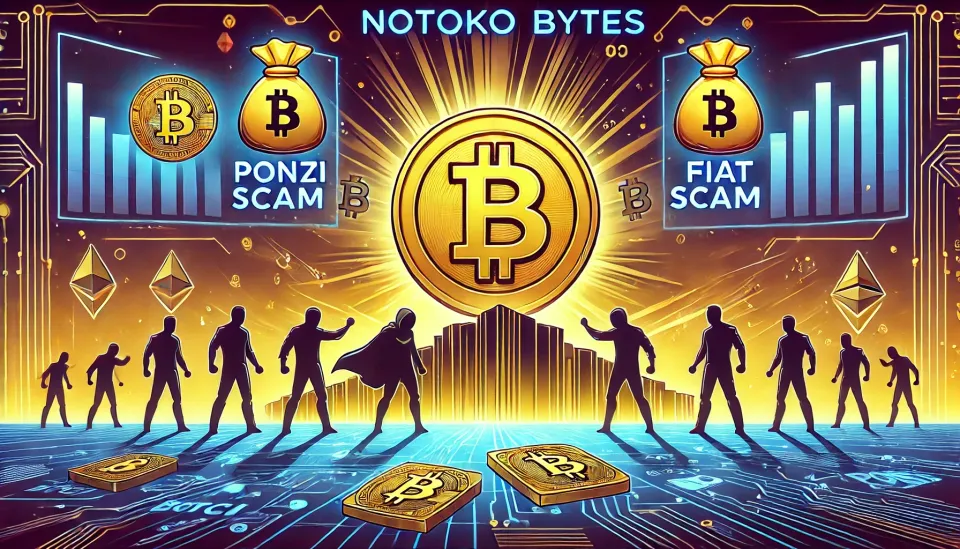Bitcoin: Ponzi or Powerhouse? Notoko's Deep Dive!

Alright, crypto fam, let’s talk scams. Ponzi schemes are the financial world's zombies—always lurking, never truly dead. 🧟♂️ From Sarah Howe’s "Ladies’ Deposit" scam in 1879 to Bernie Madoff’s $65 billion meltdown, these cons work the same way:
✅ Promise insane returns 🚀
✅ Pay early investors with new investor money 💸
✅ Collapse when the new suckers stop rolling in 😵
Now, every time crypto takes a hit, the mainstream jumps in screaming, “Bitcoin is a Ponzi!” (especially in 2025, after dropping from $108K to $81K ). But is it? Or is that just some fiat system FUD to keep you distracted? Let’s break it down. 🔍
Fiat Fairy Dust: The Real Ponzi Scheme? 🏦🔥
Before we start throwing shade at Bitcoin, let’s talk about the real financial scam: fiat money.
💸 Banks print it from thin air.
💰 Governments devalue it through inflation.
🏛 Bailouts save the rich, while the poor pay the price.
The 2008 financial crisis? A Ponzi scheme built on junk mortgage loans. The $673 trillion derivatives market? Wall Street's casino, fueled by nothing but speculation.
Meanwhile, Bitcoin? No central control. No money printing. Fixed supply of 21 million BTC. If anything, Bitcoin is the antidote to the real Ponzi. 🚀
Bitcoin: The Rebel with a Cause? 🏴☠️
Satoshi Nakamoto didn’t just invent Bitcoin in 2009 for fun—they launched it right after the biggest financial collapse since the Great Depression. Coincidence? Nope.
🔹 Decentralized: No banks, no governments, just peer-to-peer transactions.
🔹 Fixed Supply: No money printing, just pure supply-and-demand economics.
🔹 Trustless System: Code over corrupt institutions.
So why does Wall Street call Bitcoin a Ponzi while continuing to push real Ponzi schemes like the stock market and government bonds? 🤔
Bitcoin ETFs: The New Ponzi Playground? 🎪
And now, we’ve got Bitcoin ETFs—Wall Street’s latest scheme to get their hands on crypto. BlackRock, Fidelity, and the big banks want you to trade Bitcoin like a stock, but what they really want is to control it.
📉 ETF Bitcoin = Paper Bitcoin = Banks controlling supply.
🏦 Custodial Holding = No real Bitcoin for you.
🎭 Derivatives = The next financial bubble.
If Wall Street turns Bitcoin into just another financial product, they’ll do what they always do: manipulate it, crash it, and profit off your losses.
The Bitcoin Paradox: Savior or Scapegoat? ⚔️
Here’s the plot twist: Bitcoin isn’t a Ponzi, but it’s being used to prop up the biggest Ponzi of all—the fiat system.
🌎 Governments print money -> Inflation skyrockets
🏦 Banks create fake financial products -> Economic bubbles form
📈 They pump Bitcoin ETFs -> Retail investors get rugged
Bitcoin was designed to free people from this system, but Wall Street wants to turn it into another casino chip for their financial games. 🤯
Notoko’s Verdict: Stay Woke, Crypto Crew! 🐸🔥
The real Ponzi isn’t Bitcoin. It’s the banks, governments, and financial elites who want to keep you trapped in their debt-based illusion.
✔️ Bitcoin is NOT a Ponzi. It’s digital gold, a decentralized hedge against financial corruption.
⚠️ Wall Street’s Bitcoin ETFs? Potential Trojan Horse.
🔑 The solution? Hold your keys, not your ETFs.
Bottom line? Don’t let the biggest financial scammers in history turn Bitcoin into their next Ponzi. 🏴☠️🚀
🔥 Want more spicy takes like this? Subscribe to Notoko Bytes & get the truth straight to your inbox! 🔥

Disclaimer
*The information and analysis provided in this article are intended for educational and informational purposes only and should not be considered as financial, investment, or professional advice. While our team strives to ensure the accuracy and reliability of the content, we make no representations or warranties of any kind, express or implied, about the completeness, accuracy, reliability, suitability, or availability of the information presented.
The content within this article may include opinions and forward-looking statements that involve risks and uncertainties. The blockchain and cryptocurrency markets are highly volatile, and past performance is not indicative of future results. Any reliance you place on the information presented is strictly at your own risk. Before making any investment decisions, we highly recommend consulting with a qualified financial advisor or conducting your own thorough research.
By accessing and using the information provided in this article, you acknowledge and agree that neither the authors, publishers, nor any other party involved in the creation or delivery of the content shall be held liable for any direct, indirect, incidental, consequential, or punitive damages, including but not limited to loss of profits, goodwill, or data, arising out of your use or inability to use the information provided or any actions you take based on the information contained within this section.*
